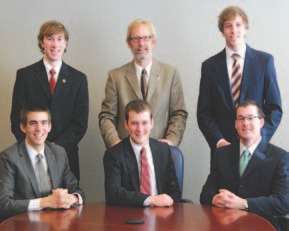Student investment group backs entrepreneurship at MU
Two recent University of Missouri graduates have started a student angel investment group, an enterprising idea that gained a toehold with the aid of an assistant teaching professor in the Trulaske College of Business.
Accounting major Ryan Wenk and business administration major Kyle Cleeton initiated the project, and W.D. Allen taught an interdisciplinary class on the subject in fall 2010. Ray Troy, a 2006 mechanical engineering student currently working on a master’s in nuclear engineering, participated in this inaugural effort. He heard about the class as a member of a campus entrepreneur club.
Troy, who operates an Internet business that sells sunglasses and is a partner in two other online ventures, said his motivation for getting involved was the possibility that someday he might need to propose a business plan to an angel investment group.
“With this class, I’ll know it from both sides,” Troy said.
The Student Angel Capital Program started in late October after the founders wrote a successful proposal for a Kauffman Commercialization Leaders Grant. The Ewing Marion Kauffman Foundation provided $50,000 to the group.
“The fact that MU students can own their own intellectual property was a development that helped convince the Kauffman Foundation to fund us,” Allen said. “The $50,000 is going 100 percent toward investing in intellectual property endeavors of students and faculty.”
Allen predicted the group might look at as many as 100 deals and whittle them down to a handful that meets the criteria of the diverse group, which includes engineering, agriculture, journalism, law, veterinary, medical and business students.
Troy and Allen both said the multidisciplinary makeup of the group will play a key role in every step of the process, from performing prescreening and completing due diligence activities as the group looks at its options through the contracting phase.
“The diversity will really pay off,” Allen said. “We can go to an engineer for help drafting a prototype; law students can help with contracting elements.” The potential entrepreneurs will then make formal presentations.
“There will be someone in the group who understands the need and someone who can actually analyze the product,” Troy said. “For instance, what if a business like Newsy came along? We’d want someone who knows about media for due diligence on the project — like a J-school student.” This fall, another nuclear engineering graduate student, John-David Seelig, will join the group.
“The bottom line is that students may decide to invest in two or three of the groups, or maybe none,” Allen said. “When we do decide, we’ll go through the negotiation phase, investment contracting and will monitor our investments.” No deal will be considered without potential returns of 15 to 20 times the group’s investment.
In addition to the class, Allen said an angel investors club has been formed that will function like a “farm team” for the actual investment group.
“Everybody who has participated in the class will be on our advisory board,” Allen said. “When you’re dealing with projects from investment to harvest, this could involve a four- or five-year time horizon. We don’t want to lose track of any historical information.”
Troy said he liked the class’ “out-of-the-box” model. “You’re a real investor, and you have all this money to spend,” he said. “It involves real critical thinking. Ryan and Kyle noticed that when you talk to recruiters about investing real money, they get excited.”
Last semester, the group worked to establish a presence in the community through outreach to middle school students, among other activities.

“We’re just getting our name out there and establishing our reputation,” Allen said. “Entrepreneurial efforts are exploding all over campus.”
Jan Wiese-Fales directs external relations for MU’s College of Engineering.


